Richard Linklater Me and Orson Welles Interview
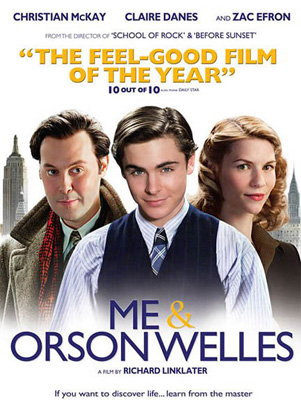
LINKLATER AND THE WORLD OF ORSON WELLES.
EXCLUSIVE Richard Linklater, Me and Orson Welles Interview by Paul FischerOne of the most original directors of his generation, Richard Linklater can move effortlessly from Hollywood's mainstream to the Indie world, but even with his proven track record, the director of such seminal classics as Dazed and Confused and Before Sunrise as well as the hit School of Rock, says it's just as difficult getting films made. His latest movie is the adaptation of the novbel Me and Orson Welles, centred around Welles' early career in the theatre and the teenager who joined his production of the now famous Julius Caesar. Linklater talked to Paul Fischer in this exclusive interview.
QUESTION: Did you come across this through the original source material, or was it already a script that was kind of floating around?
RICHARD LINKLATER: Oh, no, it was the book. My colleagues Vince and Holly, we all read the book and kind of rallied around that. You know, I optioned it with my own money, and we just sort of proceeded from there.
QUESTION: What were the challenges, from an adaptation from book to screenplay?
RICHARD LINKLATER: Nothing - it's pretty faithful to the book. It's just cutting it down, and picking your battles; that was the main thing. And getting to the play quicker, just, typical adaptation challenges.
QUESTION: One of the recurring elements of your work, I guess, is that there's a balance between the visual and the dialogue. I mean - the written word is as important to you as the visual theme. Where does that come from?
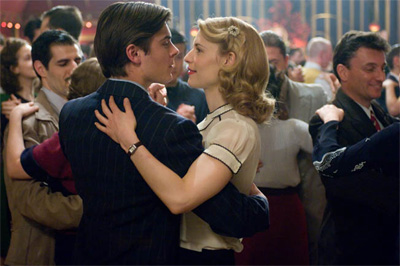 RICHARD LINKLATER: Well, I don't know. I mean, I'm pretty much known as a dialogue, actor-guy, but as a filmmaker, I'm obsessed with the image. The two things I care about most are what the camera's doing, obviously, as a filmmaker, and the actors. I feel my job is, in addition to collaborating with everyone, that's really what I'm most interested in.
RICHARD LINKLATER: Well, I don't know. I mean, I'm pretty much known as a dialogue, actor-guy, but as a filmmaker, I'm obsessed with the image. The two things I care about most are what the camera's doing, obviously, as a filmmaker, and the actors. I feel my job is, in addition to collaborating with everyone, that's really what I'm most interested in. QUESTION: Thematically, Me and Orson Welles seems to be the ideal Linklater movie, because it does explore themes that have always been of interest to you. And it does remind one of how powerful the written word is. I mean, is that what one of the attractions of this book was to you?
RICHARD LINKLATER: Yeah. I mean, it's a lot of dialogue, and a lot of these interactions, but you say challenge of the written word. Well, with Shakespeare there's the written word there and yet, Shakespeare's adaptable. I kind of like that as a metaphor. Here's this thing seemingly written in stone. You know, "Shakespeare, original portfolio, here's the story." But yet, you can really play with it, and find your way into it, and personalize it and change it just enough. You know, Welles was a genius at that. He had - he would pull in a line from a different Shakespeare play, like he does in this. He grabs scenes from other Shakespeares that work. He felt it was all his palette to play with. And he successfully does this. Even in Chimes at Midnight, one of his last great Shakespeare films only he could kind of pull it together that way.
QUESTION: Now, the casting of this must have been very, very challenging for you. Welles is such an iconic figure. How did you come about casting Christian McKay because he's amazing?
RICHARD LINKLATER: I mean, gosh, what a challenge. I was like, "Well, my respect for Welles is such that I'm not gonna just throw anybody in there and say that's Orson Welles. If I can't find the right Orson Welles, you know, we're not making this movie. What's the point?" You know. It's too much work to misfire on that key element. And - you can't lie to yourself. So, I felt it was like the film gods were handing me this movie, when Christian McKay emerged.
QUESTION: Where is the line between mimicry and performance?
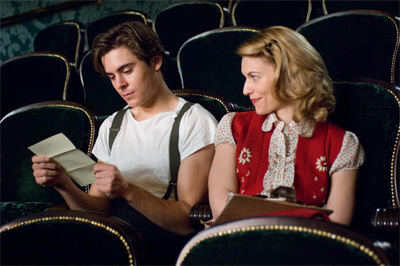 RICHARD LINKLATER: Well, I think you know it when you see it and I'm proud to say - you know, Christian goes far beyond any notion of an impersonation. I think he brought so much of himself to it. Christian himself is a very Wellesian character. He's boisterous, he's brilliant, he's got incredible stories. He's a bigger-than-life personality. He's been told he was a genius since he was four years old, playing the piano. You know, just like Welles. He grew into a world class pianist. He's kind of a lofty fellow, in that regard. So, he's very Wellesian. Even though this was his first movie, he sort of - you know, he embodied this character. And when -- he brought so much of himself to it. By the end, when he's going, "How the hell do I top this?" That's not Welles, that's Christian, you know? We project Welles onto that. But there's a guy behind there who's having a very similar experience.
RICHARD LINKLATER: Well, I think you know it when you see it and I'm proud to say - you know, Christian goes far beyond any notion of an impersonation. I think he brought so much of himself to it. Christian himself is a very Wellesian character. He's boisterous, he's brilliant, he's got incredible stories. He's a bigger-than-life personality. He's been told he was a genius since he was four years old, playing the piano. You know, just like Welles. He grew into a world class pianist. He's kind of a lofty fellow, in that regard. So, he's very Wellesian. Even though this was his first movie, he sort of - you know, he embodied this character. And when -- he brought so much of himself to it. By the end, when he's going, "How the hell do I top this?" That's not Welles, that's Christian, you know? We project Welles onto that. But there's a guy behind there who's having a very similar experience.QUESTION: On the other hand, on the other end of that, I think, spectrum, you've got Zac, who's become a teen idol, who's starting out, who's fresh, and doesn't have the theatricality, obviously, of that character. Why did you cast Zac in the first place? I mean, what was it about him that you felt could pull this off?
RICHARD LINKLATER: Well, surprisingly this was a character Zac related to enormously. I mean, Zac started in the theatre. He traveled in shows and he has a big theatre background. So like every actor, they could really relate to the backstage story that we had going here. And Zac has a lot of charisma who's a real leading man, so, I needed someone who could go toe to toe with one of the biggest personalities of the 20th century. It would be easy for him to blow this guy off the screen, but it really is Zac's character's story. You see Welles kind of through himm so, I wanted the "him," the "me" in Me and Orson Welles-I wanted that guy to be really strong, you know? So you don't forget him. You know, he doesn't blend into - he doesn't disappear. So, I don't know. I thought Zac had all those qualities. He's really smart and if you underestimate him, you know, the way Welles does for a second, you realize, "Oh. He's actually a couple of steps ahead of you."
QUESTION: Is this a film that will change audience's perceptions of Zac?
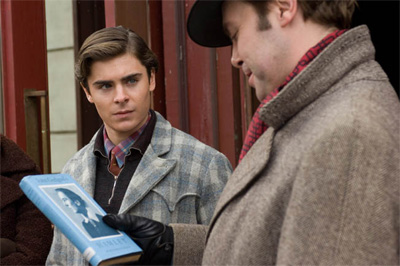 RICHARD LINKLATER: Yeah. I mean, I think maybe the older half of his audience - you know. Or, whatever - I don't know. It's abstract to me - you know, his fan base, and all that. I know he's popular with a big crowd of young people. But I - in my heart of hearts, I always felt that they would like this movie, too. Because it's about a teenager who - you know, is suddenly performing with these older people. And it's kind of a teenage fantasy, to - you know, for theatre gigs. You know, you get a part on Broadway. A small part, but what 17-year-old wouldn't want that? You know. So, it's sort of a little teen fantasy. There's elements of this. And even the old people, they're not old. They're in their early 20s. it's a very youthful - I mean, it's a coming of age story for Zac's character, but it's also a coming of age for Welles. You know, he's figuring out who he is, you know?
RICHARD LINKLATER: Yeah. I mean, I think maybe the older half of his audience - you know. Or, whatever - I don't know. It's abstract to me - you know, his fan base, and all that. I know he's popular with a big crowd of young people. But I - in my heart of hearts, I always felt that they would like this movie, too. Because it's about a teenager who - you know, is suddenly performing with these older people. And it's kind of a teenage fantasy, to - you know, for theatre gigs. You know, you get a part on Broadway. A small part, but what 17-year-old wouldn't want that? You know. So, it's sort of a little teen fantasy. There's elements of this. And even the old people, they're not old. They're in their early 20s. it's a very youthful - I mean, it's a coming of age story for Zac's character, but it's also a coming of age for Welles. You know, he's figuring out who he is, you know?QUESTION: Now, as a filmmaker, you've divided your career, I suppose, between the commercial mainstream - sort of the commercial mainstream, and the more indie world that I guess you are very comfortable within. Has it been difficult for you to define material that interests you, either within or without the studio system?
RICHARD LINKLATER: I never really think about it, whether it's a studio film. And people are surprised to hear - like, Dazed and Confused was a studio film. I did that for Universal, you know? it came out in '93. That's a studio film. This is an indie. You know, on the surface, this looks more - you know. Who knows? I don't really discriminate. Anyone who wants to finance a film that I want to do is okay with me. You know? So, I'm lucky that I kind of have a foot in all the worlds, and have a certain latitude to do different kind of projects. But it's still a struggle. I mean, for every film I get made, there's usually a film I don't get made that I have a script for, and just can't get financing for. So, it's always tough.
QUESTION: Now, there's all these rumors that there's gonna be a School of Rock sequel. Do you want to do that?
RICHARD LINKLATER: Yeah, I did a sequel, which makes me even more discriminating. You know, like, you don't do it - especially not the year after the success. You know, if you wait some time, you have to make that an element. So. I don't know. If there's ever a School of Rock II, it'll be the right - we don't want to do it just to do it, you know? I'd love to work with Jack again, but it's gotta be right, and for the right reasons, I think.
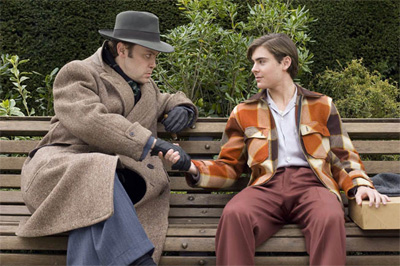 QUESTION: What do you think you would like to do next? I mean, is there a dream project?
QUESTION: What do you think you would like to do next? I mean, is there a dream project?RICHARD LINKLATER: Yeah. I've got some longer term projects that I'm still writing and working on, that are several - they're years down the road. But in the immediate future, I have three scripts. One's kind of a college comedy that I wrote. One's kind of a true crime story that's also funny. Kind of a dark comedy. One's a movie set in the Middle Ages. You know, so I'm all over the map, you know, as always.
QUESTION: The Middle Ages?
RICHARD LINKLATER: I'll say no more. That's plenty. Who knows if I'll ever get that off the ground?
QUESTION: Do you look at your career and ask - I mean, is it harder now for you as a filmmaker, even with your track record, to get the kinds of movies made that you want to get made?
RICHARD LINKLATER: It's harder for everybody right now. I mean, if any of us feel sorry for ourselves, you just look around and say, "Oh my God, they can't get"- you know. So, it's just a really tough time. You know, the film industry has changed enormously just in the last couple years. So, yeah, it's a tough time. Especially for the middle ground that I tend to occupy. So - you know, I'm lucky I got this film made.
QUESTION: Where did the filmmaker come from within you? I mean, where did he spring from?
RICHARD LINKLATER: Within me?
QUESTION: Yes. Why did you want to be a filmmaker?
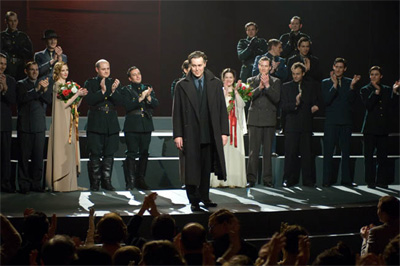 RICHARD LINKLATER: Oh, my gosh. I don't know. It certainly wasn't my birthright. [LAUGHTER] I didn't grow up in a - you know, a family of artists or filmmakers, certainly. You know. I don't know. I discovered it - it took me a while. I was always a writer, from the youngest of ages. And I got interested in theatre. And I actually directed Julius Caesar when I was 13, the junior high production. I was - I kind of co-directed it with the teacher. We were all supposed to be in the play, or audition for a part. And I told her, "I don't want to do that. I want to work with the actors, and design sets, and work the costumes." And - you know, I was a big picture guy. And the teacher let me kind of - you know, let me go with that, and it was a lot of fun. But I didn't - you know, I picked it back up again in college, was writing plays. But once I discovered cinema, you know, I moved to a town where I could see a bunch of films. Once film clicked in, I never looked back. I dropped everything else and just said, "Okay." I had discovered my medium. I think it's a visual quality, visual memory. I just - that's the way my brain works. So, it took me a while to find that. I think kids - kids can find that now much earlier, where it took - you know, I was 20, 21, 22, when I fully decided to dedicate myself to film.
RICHARD LINKLATER: Oh, my gosh. I don't know. It certainly wasn't my birthright. [LAUGHTER] I didn't grow up in a - you know, a family of artists or filmmakers, certainly. You know. I don't know. I discovered it - it took me a while. I was always a writer, from the youngest of ages. And I got interested in theatre. And I actually directed Julius Caesar when I was 13, the junior high production. I was - I kind of co-directed it with the teacher. We were all supposed to be in the play, or audition for a part. And I told her, "I don't want to do that. I want to work with the actors, and design sets, and work the costumes." And - you know, I was a big picture guy. And the teacher let me kind of - you know, let me go with that, and it was a lot of fun. But I didn't - you know, I picked it back up again in college, was writing plays. But once I discovered cinema, you know, I moved to a town where I could see a bunch of films. Once film clicked in, I never looked back. I dropped everything else and just said, "Okay." I had discovered my medium. I think it's a visual quality, visual memory. I just - that's the way my brain works. So, it took me a while to find that. I think kids - kids can find that now much earlier, where it took - you know, I was 20, 21, 22, when I fully decided to dedicate myself to film.QUESTION: Who were your greatest influences when you were starting out?
RICHARD LINKLATER: Oh, I would take on genres. I was just like, "Oh, the French New Wave." Or, I just loved everything. You know, once you - it's kind of like a musician. You just love all music. You know, I love all films. Documentaries, experimental films, European cinema. You know, big commercial films. I kind of love it all. And that's the thing - you start making films of your own, and your world narrows a little bit. It's like - oh, I guess I'm not that, and I'm not that. You know. I didn't really know what was in store for me. I was surprised my films were funnier - I felt my films were funnier than I am.
QUESTION: Oh, really?
RICHARD LINKLATER: Yeah. Like, I don't know. It's not like I'm overly serious, but - I guess I'm funny. But I don't talk that much - I don't even talk that much. I don't hang out in cafes and coffee shops, and - I just kind of worked all the time. So, I was surprised as anyone when my films came out a lot funnier than anyone would have expected.
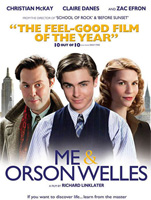
Me and Orson Welles
Starring: Zac Efron, Christian McKay, Claire DanesDirector: Richard Linklater
Genre: Dramas
ME AND ORSON WELLES, Richard Linklater's new coming of age feature set in 1937 stars Disney teen throb Zac Efron, star of High School Musical, who stretches himself as an actor playing the young aspiring actor Richard who lands a job with Orson Welles (played by newcomer Christian McKay) and his legendary Mercury Theatre Company.
The whirlwind experience of working with the boy genius and appearing in Welles' soon-to-be groundbreaking production of Julius Caesar as Lucillus sets his life on a new course. In that same week, he also finds romance with older woman Sonja (Claire Danes). Experiencing romance and immersed into a creative process few are afforded, Richard also learns a few lessons about crossing swords with the imperious and brilliant Welles. He must grow up fast.
MORE





